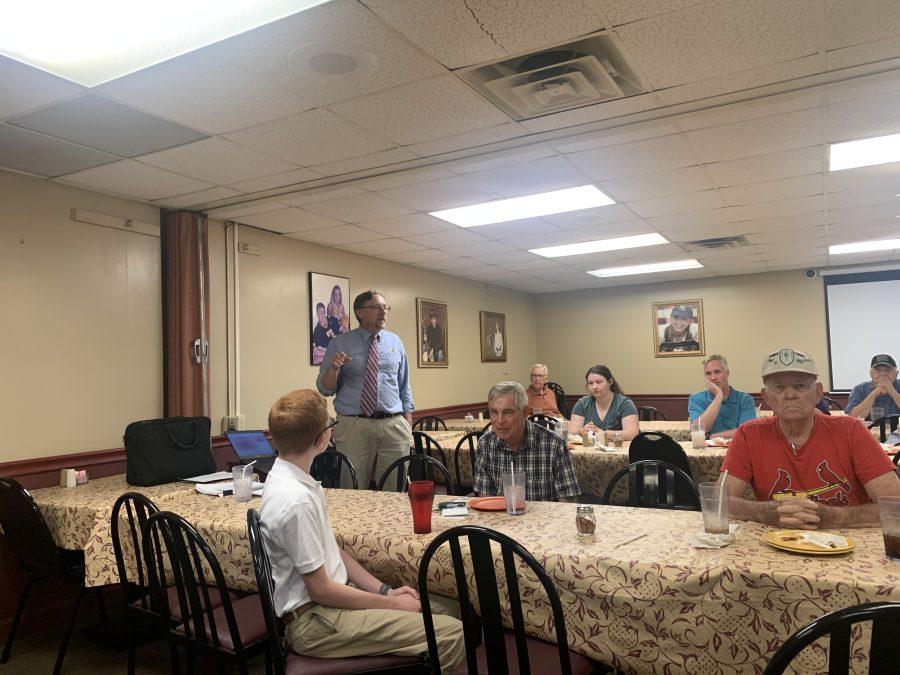Raleigh Hightower
Lifestyle Editor
rhightower@murraystate.edu
After the conclusion of the United States Supreme Court’s Landmark 2021-2022 term, Associate Professor of Political Science Paul Foote is leading several presentations about the Supreme Court’s opinion in Dobbs v. Jackson Women’s Health Organization.
Foote’s first presentation was hosted on Monday, Aug. 22 at Pagliai’s Pizza and Italian Restaurant. Foote also will be presenting at the Department of Political Science’s annual Constitution Day celebration this semester.
In the Dobbs decision, the Supreme Court decided in a 6-3 vote to uphold a Mississippi law banning abortion after 15 weeks of pregnancy, and in a 5-4 vote to overturn the constitutional right to abortion established in cases Roe v. Wade and Planned Parenthood of Southeastern Pa. v. Casey.
Foote opened his discussion of the Dobbs decision by posing a question to his audience.
“Why, after 49 years, would the U.S. Supreme Court decide to overturn one of the most decisive, controversial issues of our time?” Foote asked. “I believe what explains this monumental change in constitutional law is the ascent of originalism.”
Originalism, as defined by the Merriam-Webster Dictionary, is “a legal philosophy that the words in documents and especially the U.S. Constitution should be interpreted as they were understood at the time they were written.”
The philosophy of originalism was at one time commonplace in Supreme Court decisions, Foote explained.
“In the 19th century, Supreme Court rulings predominantly featured originalist arguments,” Foote said. “In the early to middle part of the 20th century, originalism fell out of favor in the U.S. Supreme Court.”
One factor Foote attributes to originalism’s return is the formation of a group known as the Federalist Society.
“It was not until 1982 [that] the Federalist Society for Law and Public Policy was founded, and they were founded [so] that original thought could make a comeback,” Foote said. “In 2020, the Federalist Society included 70,000 members. That is a lot of lawyers [and] jurists that believe in this type of thinking and believe that it should dominate.”
The Federalist Society explains on its website that the organization “is a group of conservatives and libertarians interested in the current state of the legal order.” Foote says that this organization has influenced Supreme Court decisions because many of the current Supreme Court justices have been associated with the organization.
“All of the judges on the Dobbs majority are current or former members of the Federalist Society,” Foote said. “Six of the nine on the current Court have been influenced by the originalist school of thought.”
Foote presented some of the key points illustrated in the opinions written by the justices who sided with the Court’s majority. One of the critical points Foote discusses comes from the opinion of Justice Clarence Thomas.
In his opinion, Thomas calls for the elimination of substantive due process, which according to Cornell Law School’s Legal Information Institute is “the principle that the Fifth and Fourteenth Amendments protect fundamental rights from government interference.”
These fundamental rights have been interpreted by the Supreme Court in the past to include the right to use contraceptives decided in Griswold v. Connecticut, the right to marry a person of a different race decided in Loving v. Virgina and the former right to abortion decided in Roe v. Wade.
“Really what he is saying here is that we should never even have gotten involved in these relationship rights, [that] we should have stayed in economics,” Foote said. “He says in future cases he calls for the Court to reconsider these precedents like Griswold.”
The presentation closed with Foote discussing the dissenting opinion authored by the three liberal justices Sonia Sotomayor, Stephen Breyer and Elena Kagan.
“They claim the majority has thrown away the balance between when states can regulate and a woman’s right to have an abortion before viability,” Foote said.
Those interested in learning more about the Supreme Court’s philosophical changes and the decision in the Dobbs v. Jackson Women’s Health Organization case can follow the Department of Political Science on Facebook for news on the Constitution Day discussion.




























































































